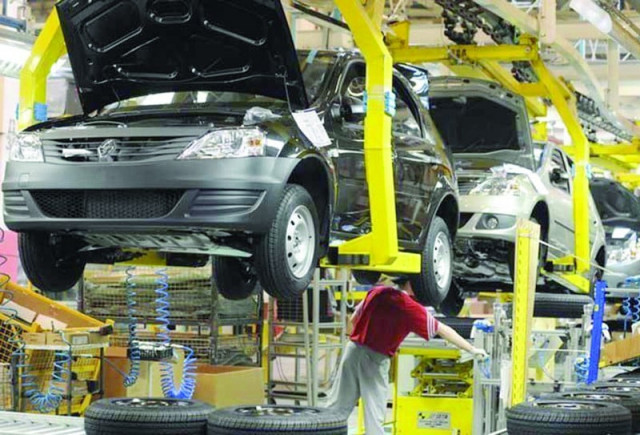Auto sector grows despite inflation
Foreign car companies are entering Pakistan to capitalise on opportunities

Despite mounting inflation, rising commodity prices and contraction in purchasing power of the public, foreign automobile brands are entering the Pakistani market to capitalise on the available opportunities.
Peugeot, a European car company, announced on Saturday to kick start manufacturing of cars in Pakistan in partnership with Lucky Motor Corporation.
“The first step of the partnership will begin with the introduction of the locally-built Peugeot 2008,” revealed Lucky Motor Corporation Chief Executive Officer Asif Rizvi.
He continued that a European car would be available to the consumers of Pakistan for the first time in history.
Lucky Motor Corporation came into existence as a result of the government’s new entrant policy under the Auto Industrial Development Policy (AIDP) 2016-21.
He termed the policy successful as it offered concessions to new brands and products and created a level playing field between existing and new market players.
As a result of the initiative, 12 new car manufacturers entered Pakistan, lifting the total number of vehicle makers to 15, he pointed out. He added that the policy aided the introduction of 25 new vehicles in the country as well.
He revealed that the company had also ventured into auto part manufacturing in partnership with other vehicle manufacturers and established a manufacturing facility to produce seats, wire harness, air conditioners and injection molding parts for the automobile plant.
He reiterated his commitment towards indigenisation of parts in the country.
The company has also entered into eight technical assistance agreements with four Korean autopart suppliers for transfer of technology in Pakistan, he added.
At present, all cars assembled in the country come from Japanese, Korean or Chinese assemblers. The consumers’ choice “is limited to cars designed from the Far-East”, he said.
He added that car companies were aware of this gap and they were capitalising on it.
Rizvi further said that the expansion of operations and network of Peugeot would create job opportunities in the market.
“Electric vehicles (EVs) are the future of mobility globally and by 2025, 80% of all vehicles of the company would be electric,” he said.
Speaking on the occasion, Peugeot CEO Linda Jackson said “we are delighted with this partnership and what it means for the Pakistani market”.
“It will be the first time a European car is going to be assembled in Pakistan,” she said while pointing out that the partnership would create employment, boost localisation and expand local automotive industry.
Insight Securities auto analyst Ali Asif told The Express Tribune that a slowdown in auto sales had begun to emerge due to multiple price revisions of vehicles coupled with rising automobile financing rates, higher inflation and fuel charges.
However, despite the challenging environment, “we believe that this company would prove to be a success in the Pakistani market because of the growing popularity of SUVs”.
The automobile companies of Pakistan have projected sharp growth owing to reduction in age of earning in Pakistan on the back of rapid digitalisation.
“On average, the first paycheck was received by the previous generation at the age of 27 but now, the threshold has declined to 21 years, thanks to the opportunities arising from digitalisation,” said Changan Master Motors Sales and Marketing Director Syed Shabbiruddin earlier during the week.
The company is targeting customers of age group 25 to 64 years, revealed a presentation given by the official.
A massive chunk of youth belonging to the generation Z is entering the pool of car buyers with each passing year.
Such people begin to earn from a young age, at around 21 years, and rapidly advance through the social classes of the society, he said.
“Growing number of females in the corporate sector will also result in a notable increase in the proportion of females buying their own cars,” he said. “Each year, one in six affluent customers purchases a new car on average.” The affluent class will widen to 21 million people by year 2026, 27 million by 2031 and 29 million by 2036.
SI global CEO Noman Ahmed Said told The Express Tribune that due to rapid increase in online jobs, youth has far better chances to earn compared to previous generations. The introduction of new manufacturers and the support provided by the government paved the way for the increase in car sales in the economy, he said.
Published in The Express Tribune, March 13th, 2022.
Like Business on Facebook, follow @TribuneBiz on Twitter to stay informed and join in the conversation.



















COMMENTS
Comments are moderated and generally will be posted if they are on-topic and not abusive.
For more information, please see our Comments FAQ